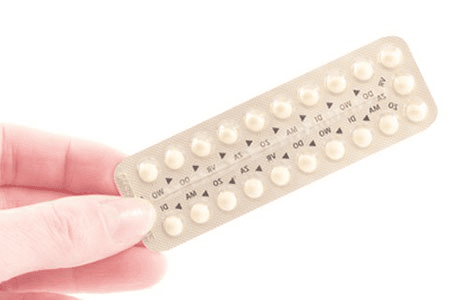This is an automatically translated article.
The article is professionally consulted by Doctor Department of Obstetrics and Gynecology, Vinmec Hai Phong International General Hospital.
Recommendations when using oral contraceptives for women who are breastfeeding are mainly related to milk production. So, why are progestin-only birth control pills considered safe while breastfeeding?
1. What are progestin-only birth control pills?
Normally, there are 3 main types of hormonal contraceptives for women, including:
Synthetic estrogen and progestogen contraceptives (Combined Oral Contraceptive - COCs); Birth control pills containing progestin alone (a synthetic form of progesterone); Emergency contraceptive pills. In particular, the progestin-only contraceptive pill has the English name Progestin-Only contraceptive Pill (abbreviated POPs), also known as "mini-pill". As the name suggests, this drug has only one ingredient, progestin, because it does not contain estrogen, so there are fewer side effects.
Similar to other hormonal pills, progestin-only birth control pills also have 3 mechanisms of action:
First: The effect of progestin causes the ovaries to stop releasing eggs each cycle; Second: In the event that ovulation has occurred, the mini-pill produces a number of changes that make the uterus no longer favorable for embryo implantation; Finally: POPs thicken the mucus between the uterus and vagina to prevent sperm from reaching the egg.
2. Contraception while breastfeeding with POPs

Progestin-only oral contraceptives are considered suitable for women during breastfeeding because progestins do not affect lactation nor the composition of milk. Meanwhile, estrogen found in other hormonal contraceptives reduces the quality and quantity of milk.
Although it is possible to take the pill immediately after giving birth, the World Health Organization WHO recommends that women use POPs after 6 weeks postpartum. At this stage, the mother's milk production is fully established, so the use of low-dose mini-pills will not have much impact on the duration of breastfeeding, as well as the general nutritional status of the baby. new-born.
However, the progestin-only pill is less effective than the combined hormonal pill, with a failure rate of about 8% within the first year of use. Therefore in the process of contraception while breastfeeding with POPs, also known as Mini-pill, women need to keep in mind the important note:
Take the pill at the same time every day; Do not take the medicine more than 3 hours later than the fixed time; Take the medicine immediately if you forget it for 3 hours or more; Do not take 2 tablets at the same time on the next day; Use back-up birth control within 48 hours of a missed pill; Use additional birth control methods (such as condoms) for the first month of taking POPs. It is necessary to meet the above strict compliance conditions in order to maximize the effectiveness of progestin-only contraceptives.
3. Other methods of contraception while breastfeeding

In principle, a mother should not use hormonal contraceptives if she wants to prevent pregnancy while breastfeeding, except for a hormone similar to progesterone. Some safer options may instead be considered:
Non-hormonal contraception: Amenorrhea Method (LAM), IUD, IUD or condom use; Hormonal contraceptives: These include the DMPA contraceptive injection or the Implanon contraceptive implant, but can sometimes have side effects; Permanent contraception: Suitable for women over 35 years old, can be sterilized by tubal ligation or sterilization of the husband depending on wishes. In addition, combined oral contraceptives (COCs) are highly effective at preventing pregnancy, but are not recommended during lactation because they contain estrogen. According to WHO, breastfeeding women should only use COCs when the baby is 6 months or older and is able to accept a variety of foods besides breast milk.
In summary, the estrogen component in oral contraceptives is excreted in milk, which will reduce milk production and may affect infants, especially premature babies who need adequate nutrition. Therefore, progestin-only birth control pills are an appropriate choice for mothers and do not harm the baby as well as the entire breastfeeding process. Women should think about safe methods of contraception while breastfeeding from the first time having sex after giving birth to make sure they don't get pregnant.













